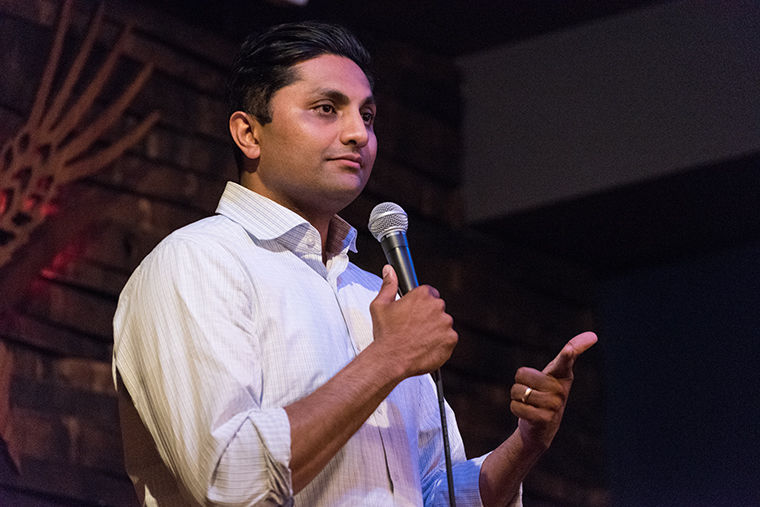Ameya Pawar: Trump, Rauner are pitting us against one another
Ald. Ameya Pawar (47th Ward) spoke to voters in Logan Square, April 26 and presented his progressive strategy to unify red and blue counties.
May 1, 2017
Illinois’ current political climate and a nearly two-year budget stalemate has caused citizens to blame each other and fight over scraps, said Ald. Ameya Pawar (47th Ward).
In a pool of candidates vying for the 2018 Democratic candidacy to challenge incumbent Republican Gov. Bruce Rauner, Pawar promoted himself as the progressive choice for voters and discussed his “grassroots” campaign to unite residents during an April 26 meet and greet in Logan Square.
“If we continue electing people who hate government, if we continue to elect people who hate the institutions they seek to represent, the government will not reflect the values that most of us share,” Pawar said at Revolution Brewery, 2323 N. Milwaukee Ave.
The son of Indian immigrants, Pawar became the first Asian-American elected to City Council in 2011. Known for pushing progressive policies, he played key roles in the ordinances for guaranteed paid sick leave for Chicago workers and increased transparency in tax increment financing projects. Pawar was a member of Mayor Rahm Emanuel’s task force that drafted the city’s minimum wage increase ordinance, according to the second-term alderman’s website.
Taking inspiration from former President Franklin Delano Roosevelt, Pawar proposed a “New Deal” for Illinois at the meet and greet. Pawar said he hopes to boost the state’s economy, end the state’s “wealth worship” and unite conservative and liberal counties by focusing on four categories of reform: education, childcare, criminal justice, and jobs and infrastructure.
While Illinois has the fifth largest economy in the country, the state’s inability to properly fund social services and equitable investments in overlooked communities is caused by a lack of political will to have the wealthy pay their fair share, Pawar said. The government should bring the community together, and the current rhetoric at both the state and national levels does not reflect that value, he added.
“You have leaders like [President] Donald Trump and Rauner who are using economic violence against all of us by pitting us against one another based on where we live and [our occupations],” Pawar said. “[They are] creating the other out of one another and using our fears to keep us divided.”
The state must also end its reliance on the regressive, inequitable and unfair system of local property taxes being used to fund public schools, Pawar said.
Charlie Caton, a school social worker and Lakeview resident, said he did not know much about the alderman prior to the town hall but was particularly impressed by Pawar’s proposal to end public education’s reliance on local property taxes.
Though Caton admitted he does not know much about the other candidates in the Democratic primary, he said he appreciated Pawar traveling outside the city to speak to downstate voters in order to hear their concerns and perspectives.
“[Pawar] seems to have an understanding of not just Chicago but also what issues are important to [downstate voters],” Caton said. “He understands the difficulties that lie ahead of him as a governor and has a realistic approach in terms of how to be successful.”
Part of Pawar’s “New Deal” includes supporting working families with paid sick leave to ensure proper childcare. He also said he wants to help students in higher education by increasing the Monetary Assistance Program and launching a program to allow students to refinance their loans.
Pawar’s push for students to have the ability to refinance their loans resonated with Sarah Langthorne, a graduate student at the city’s Pacific College of Oriental Medicine. While Pawar’s ideas speak to many voters, she said Rauner’s financial backing raises concerns about Pawar’s chances of winning and the “grassroots” movement.
“We’re going up against so much money and corporate influence,” Langthorne said. “We’re definitely the little guys. It would be wonderful if [Pawar gets elected], but we also have to keep it real that we are the underdogs.”
According to Illinois State Board of Elections records, Rauner has more than $50 million in his campaign committee, Citizens for Rauner, and Pawar has $246,203 in his, Ameya Pawar for Governor, based on their January–March quarterly reports.
Pawar said he wants the state to increase funding for mental health services and adult diversion programs to lower the high number of detainees. Pawar added he is in favor of legalizing recreational marijuana. Currently, there are two individual bills in the state legislature that would legalize marijuana for recreational use, as reported April 24 by The Chronicle.
Rauner may be vulnerable in his bid for re-election as only 35.8 percent of Illinois voters approved of Rauner’s performance compared with a 58.3 percent disapproval rating, according to a March 15 Paul Simon Public Policy Institute poll.
Other candidates in the Democratic primary for governor include state Sen. Daniel Biss, Madison County schools Superintendent Robert Daiber and businessmen Chris Kennedy and J.B. Pritzker.
Pawar said he cannot compete dollar for dollar with Rauner. However, he predicted his message, progressive agenda and willingness to listen to all state residents will put him over the top.
“I don’t think money is going to win this [election],” Pawar said. “What [I] hear from driving around the state is that people want to be heard and want someone to address the issues in their community. We are one state, and we need to start acting like one.”








